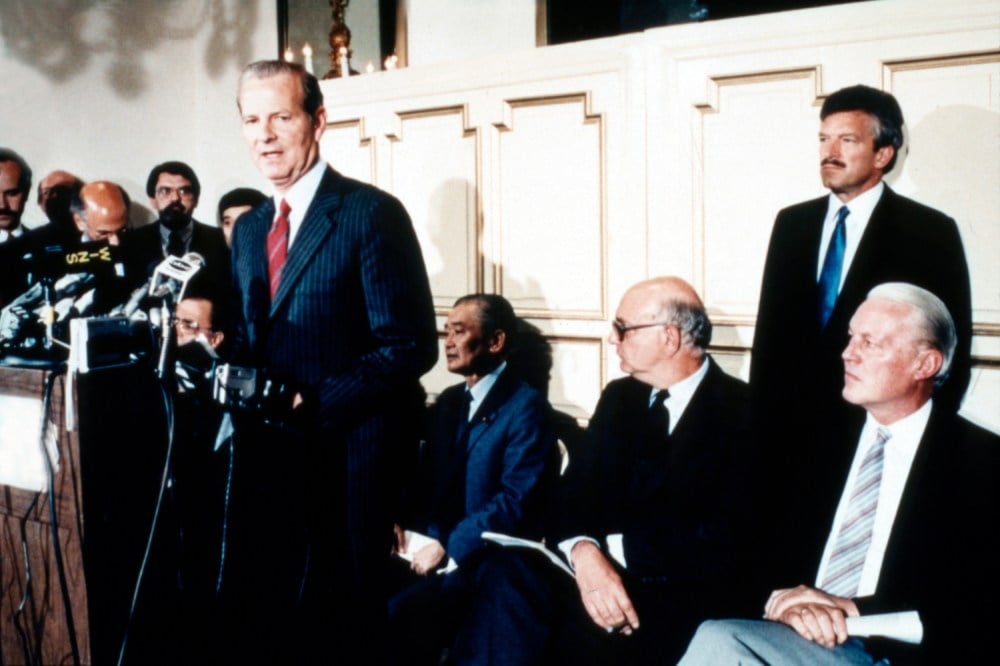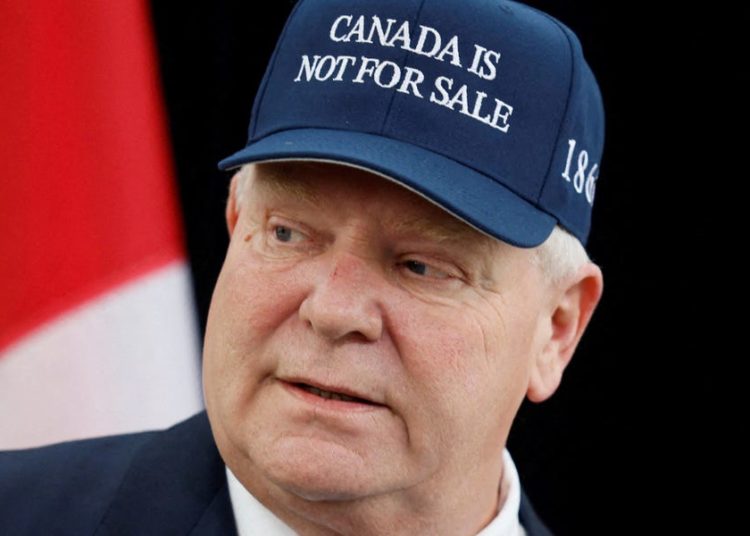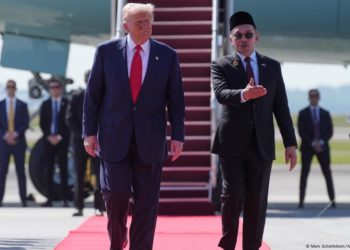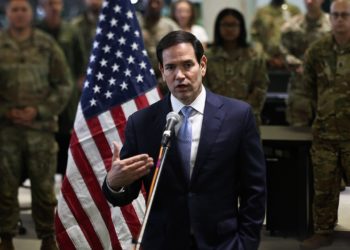Those hoping for a reprieve from the bizarre policies coming out of the White House may be alarmed to hear that the United States will hold the G-20 presidency in 2026. U.S. President Donald Trump could seize the opportunity to push the group for what commentators have begun to call a Mar-a-Lago accord—a revamped version of the Plaza Accord, signed at the Plaza Hotel in New York City in 1985, which saw Japan, West Germany, France, and Britain agree to weaken the dollar by selling U.S. Treasurys.
The motivation for a renewed currency accord stems from the MAGA ideology that links trade, the global financial system, and U.S. security guarantees. The economics of a new currency accord do not add up, however. What’s more, an agreement to weaken the dollar would be almost impossible to achieve, and it would run counter to Washington’s global interests.
No one knows what Trump really wants to do with the dollar—probably not even Trump himself. In recent months, however, a new school of thought led by U.S. Council of Economic Advisers Chair Stephen Miran has gained prominence, arguing for a weaker dollar.
Reading Miran’s November 2024 paper on the subject, in which he proposes a shake-up of the U.S.-dominated global financial system, the theory goes something like this: High international demand for U.S. Treasurys, combined with the greenback’s status as the currency of choice for global trade and finance, artificially push the dollar’s value to problematic heights. For Miran, this is the root cause of the U.S. trade deficit: An overvalued dollar makes China’s and other countries’ products too cheap and U.S. exports more expensive—and thus less competitive.
Miran is convinced that Washington needs to intervene swiftly to redress this situation. This is where a hypothetical Mar-a-Lago deal comes in. One option would be for Trump to offer other countries some form of reprieve from U.S. tariffs if they agree to help weaken the dollar. The likeliest scenario is that global central banks holding huge amounts of U.S. Treasurys would coordinate to sell these assets, thus weighing on the value of the dollar. Alternatively, foreign central banks could also sell dollars directly. However, at $7.5 trillion per day, the sheer volume of currency trading makes it unlikely that central bankers would have much of an effect on market forces.
If allies do not play ball, then Miran has a ready-made Plan B: The United States should stop paying a portion of interest on U.S. Treasurys held by foreign investors. The fact that Trump’s circle would even consider this nuclear option highlights its view on the interplay between trade, finance, and defense. For MAGA believers, withholding interest payments from U.S. Treasurys would be a way for freeloading allies to “pay back” what they supposedly owe for U.S. security guarantees.
Of course, a forced conversion from interest-bearing Treasurys to zero-coupon bonds—possibly with a maturity of 100 years—would count as a default. That, in turn, would kill the appeal of U.S. Treasurys as reserve assets, since they are supposed to be risk-free. Yet for a Mar-a-Lago-deal enthusiast, this may well be a feature, not a bug: Stripping U.S. Treasurys from their safe-asset status would surely curb demand for them.
According to some Wall Street gossip, Miran has lately been at pains to distance himself from his own prescriptions. As well he should: His central argument that trade deficits are (A) bad for the United States and (B) caused by an overvalued dollar is at odds with Economics 101. Trade deficits are not a sign that something is fundamentally wrong in an economy; they come about due to excess consumption—the main engine of U.S. economic growth—over domestic investment. The best illustration of this may be the fact that the United States last recorded a trade surplus in 1975, amid a deep recession. In addition, economic research suggests that the narrowing in the U.S. trade deficit that followed the inking of the Plaza Accord was mostly due to lower interest rates and tighter fiscal policy, not a weaker dollar.
Besides the bizarre economics, another problem with the proposed dollar-weakening deal is that the top holders of U.S. Treasurys—Japan, China, and the major eurozone countries—all have good reasons not to ink a Mar-a-Lago deal. In 1985, Japan’s willingness to sign the Plaza Accord was a reflection of its dependence on U.S. security guarantees, which now appear thin. Tokyo also has painful memories associated with the deal: Economists still debate the extent to which the massive repatriation of U.S. assets inflated the Japanese property bubble that burst in the 1990s. Meanwhile, Chinese leaders have no good reason to bring about an appreciation of the renminbi that would hurt Chinese exporters. Finally, neither the European Central Bank nor the central banks of European Union member states have a mandate to negotiate currency matters in return for U.S. tariff reprieves.
U.S. Treasury data suggests that cooperation from official holders of U.S. Treasurys would hardly be enough to move the needle, anyway. In the mid-1980s, foreigners held around 15 percent of U.S. Treasurys. This share has risen to roughly one-third, but there is a catch. Back then, official institutions owned almost two-thirds of the stock of Treasurys held abroad. Today, private investment funds in the Middle East and Asia now own the majority of foreign-held Treasurys. This makes a Mar-a-Lago deal essentially impossible to pull off: It is hard to imagine how Trump could compel a myriad of private funds to play ball, let alone in a coordinated fashion.
The final flaw of a Mar-a-Lago deal is that it would undermine U.S. interests. The dollar’s worldwide dominance gives the United States the power to leverage access to its currency in order to pursue geopolitical goals. If foreign countries move away from the dollar, the threat of losing access to the U.S. financial system through sanctions may not sound too menacing.
Such a shift may be bound to happen now anyway; Washington’s unpredictability has grown to such heights that both allies and enemies have good reason to feel that they’ll be safer moving away from the dollar. Currency dominance has as much to do with economics as with geopolitical clout, rule of law, and financial stability—all previous U.S. strengths that are quickly going up in smoke.
In his essay outlining the contours of a Mar-a-Lago deal, Miran remarked that it “is easier to imagine that after a series of punitive tariffs, trading partners like Europe and China become more receptive to some manner of currency accord in exchange for a reduction of tariffs.” Maybe he is right. However, it is just as possible that the United States does not need a Mar-a-Lago accord to depress the value of the dollar. By the time that Washington chairs the G-20, allies and foes will have endured more than a year of Trump’s insults, policy U-turns, and military threats. By then, this may have proved to be more than enough to sink trust in the greenback and curb demand for U.S. assets.
This is by far the more likely path to a weaker dollar, suggesting that the White House should be careful what it wishes for.
The post Why a Pact to Weaken the Dollar Makes No Sense appeared first on Foreign Policy.




